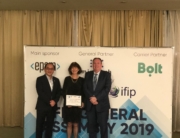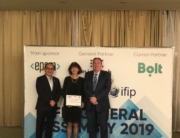MEDIA RELEASE
IFIP IP3 Denounces Actions of Technologists Who Enabled VW DieselGate Scandal
Global ICT Professional Body Calls for Ban Against Emissions Test Cheating Software
Thursday 8 October 2015 – Daejeon, South Korea: The global body for ICT professionalism has denounced the actions of software engineers who designed and implemented the solution which allowed Volkswagen to distort the results of emissions tests carried out in the United States.
IP3, the professionalism arm of IFIP, the international body for those working in ICT, has released a statement at its Annual General Meeting today calling for technologists and programmers working in the automotive industry to refuse to be associated with unethical software or systems.
Acting Chair of IP3, Moira de Roche, said ICT professionals have a clear responsibility to operate ethically and to hold the best interests of consumers at the centre of what they do.
“Living as we do in a world where software runs everything, from the computers and phones we use to communicate and process information to the cars we drive, consumers must have confidence that these systems are trustworthy and will not harm them,” said Ms de Roche.
Newspaper reports suggest the level of nitrogen oxide pollutants generated by the VW diesel engines was up to 40 times more than the US standard, suggesting real potential for health issues amongst drivers and commuters. In fact, reports in the New York Times revealed that between 40 and 106 people could have died as a result of exposure to the fumes.
“ICT professionals must operate according to a Code of Ethics and should be willing to challenge or even report any order from management that risks the safety of that organisation’s customers or staff. DieselGate is as much an indictment of the software industry as it is of the VW executives who issued the order for the software to be installed,” Ms de Roche said.
IP3 Aligned to Sustainable Development Goals
The IP3 AGM, which was timed to coincide with the IFIP World Computer Congress 2015 in South Korea, also endorsed plans to align its social value projects and the directives of the 2008 IFIP IP3 Milan Declaration to the Sustainable Development Goals, which were ratified by the United Nations just last month.
When the Sustainable Development Goals replaced the Millennium Development Goals earlier this year, they included far greater focus on technology as an enabler to achieve progress in reducing poverty, improving access to communication and education, as well as addressing environmental issues and concerns.
Ms de Roche said the Milan Declaration, which promotes the ethical and professional application of technology with particular focus on the elements of competence, integrity, responsibility, accountability and public obligation, remains highly relevant to the new Sustainable Goals.
“We plan to map the Milan Declaration and our various activities to the 18 Sustainable Development Goals and their 11 Action Lines,” said Ms de Roche. “This will allow us to easily track our progress against the goals as we contribute to the beneficial development and use of ICT in third world countries and in driving positive outcomes around the world,” she said.
The Milan Declaration can be found at http://ipthree.org/wp-content/uploads/WCC-08-ICT-P-C-Declaration-Final.pdf
ENDS
About IP3
The International Professional Practice Partnership (IP3), a project of the International Federation for Information Processing (IFIP), and is leading the development of the global IT profession by providing a platform that will help shape and implement relevant policies to foster professionalism in IT worldwide. Our mission is to establish a global partnership that will strengthen the IT profession and contribute to the development of strong international economies by: defining international standards of professionalism in IT; creating an infrastructure that will encourage and support the development of both IT practitioners and employer organizations, and give recognition to those who meet and maintain the required standards for knowledge, experience, competence and integrity. To carry out this mission, IP3 works closely with member bodies and partners who share our commitment to creating a sound global IT profession. www.ipthree.org
About IFIP
IFIP, the International Federation for Information Processing, is the global professional federation of societies and associations for people working in Information and Communications Technologies and Sciences. Established under the auspices of UNESCO in 1960 and recognised by the United Nations, IFIP represents ICT professional associations from more than 50 countries and regions with a total membership of over half a million. It also brings together more than 3,500 scientists from industry and academia, organising them into over 100 Working Groups and 13 Technical Committees to conduct research, develop standards and promote information sharing. Based in Austria, IFIP organises and supports over 100 conferences each year, fostering the distribution of research and knowledge to academics and industry practitioners alike.
Website: http://ifip.org
Twitter: http://twitter.com/ifipnews
LinkedIn: http://www.linkedin.com/company/ifip–international-federation-for-information-processing
MEDIA ENQUIRIES
Caroline New: caroline@quantumvalues.com
Shuba Paheerathan: shuba@quantumvalues.com






